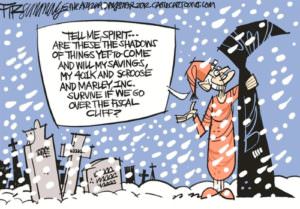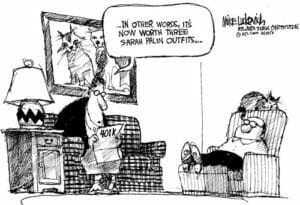‘The China Hustle’ Scares Up Empty Factories, False Profits for Investors
Filmmaker Jed Rothstein and activist Dan David explore an epidemic of unchecked financial fraud. Wall Street icon "Charging Bull," by sculptor Arturo Di Modica. (Alankitassigments / Wikimedia)
Wall Street icon "Charging Bull," by sculptor Arturo Di Modica. (Alankitassigments / Wikimedia)
“What is capitalism? Is it an economic system, or is it an apparatus that we can use to make more money for ourselves and take more money from others?” Dan David, activist short-seller and CIO of FG Alpha Management, asks this question early on in Jed Rothstein’s new documentary, “The China Hustle,” in select theaters March 30. “I think at its heart it rewards those who work hard. But it also rewards those who are willing to take advantage of others.”
David occupies the center of this David-and-Goliath tale of financial fraud in China that costs American investors billions. With an economic growth rate averaging 6 percent over the past 10 years, China has become a magnet for U.S. investors betting on reverse takeovers, a process by which foreign companies trade on the exchange by merging an existing Chinese company with a nearly defunct listed entity, circumventing the complications and costs of an IPO.
Such companies are not subject to SEC regulation, but rather to China’s regulatory body, the SAIC, which has no statutes against defrauding foreigners. So when David traveled to China to visit some of these companies, he found paper mills with non-working machinery, defunct factories, empty warehouses and a handful of staffers at a company which, on paper, was doing hundreds of millions in business. He began publishing his findings—but not before shorting their stock (betting on it to drop).
“It’s hard,” David says of his efforts to document fraudulent companies. “What we do is not legal in China. You can’t stand across a street and count trucks coming in and out of the property ’cause there’s no such thing as public property. It’s all owned by the government.”
At the center of the scandal is a banking sector that specializes in reverse takeovers. The two featured in the movie are Roth Capital Partners, famous for wild investors’ weekends with rock concerts and dancing girls, and Rodman & Renshaw Capital Group, which cultivates a more refined profile, touting high-powered Washington figures like the company’s former chairman, Gen. Wesley Clark, who is interviewed in the movie. As questions raise ethical concerns about the behavior of Rodman & Renshaw under Clark’s tenure, he finally grows agitated and stomps out of the interview.
“He says in the film that he didn’t have anything to do with setting up these deals, and when he heard about them he urged people in Rodman & Renshaw to stop. And I take him at his word,” Rothstein says. “My reasoning for including Gen. Clark in the film is I think one of the problems in our financial world is the ability of companies like Rodman to rent the credibility of figures like Gen. Clark and a lot of other political celebrities who speak at these events.”
David agrees with Rothstein, but he feels that Clark is getting off easy. “He freely admits that at some point he knew something was wrong and he said: ‘Hey, cut this stuff out,’ and left. So why is it me going to Congress and talking to these people? Why isn’t it the guy who ran for president and knows people down there?”
When David took the matter to Capitol Hill, he naively anticipated swift action by lawmakers to protect investors. Instead, he was admonished for undertaking such a large initiative. Suggesting a hearing in both the Senate Finance and Banking Committees, he was politely rebuffed. So David offered up a plan for an asterisk and warning placed next to dubious listings, which would enable investors to decide on their own.
“They couldn’t even get that done. I was amazed. It was daunting enough for me to realize I was fighting a country. Then I realized I was fighting two countries, one of them my own.” David sighs, shaking his head. “This is a fraud people don’t know about. They’ve stolen from pension funds, they’ve stolen from 401(k) [accounts]. So how does it affect you when your teachers’ funds are being stolen—tens of millions at a time? Because most teachers’ pension funds are underfunded and when they have to get re-funded your property tax goes up. The state employee fund is underfunded, and when it’s got to get re-funded your taxes go up for the state.”
Like David, Rothstein sees a solution in regulations that encourage transparency and accountability, anathema to lawmakers in the current climate. “A tax code that is more equitable would be a start. Keeping in place a lot of the requirements for transparency and accountability in banking, especially dealing with international stocks, having some mechanisms to ensure that stocks listed on U.S. exchange—the laws that govern our financial market here—can apply to those stocks.”
While an appetite for banking regulations can be found among leaders on the left, Rothstein has yet to see similar leanings among Independent and Republican lawmakers. But in David, a Republican candidate for Pennsylvania Congressional District 4, he may have found his man.
“I’ve got all kinds of things I care about in this country,” David says. “Some care about abortion, some care about immigration, some care about health care. But if you can’t fix this, what good are you?”
David will run as a single-issue candidate, but Rothstein sees the problem in a greater context that calls into question the very nature of our economic culture. “The income inequality gap is growing and a lot of it has to do with the reward given to capital over labor,” he concludes. “That’s the bigger argument coming out of this—can we have capitalism that plays by rules that are more fair?”
As we navigate an uncertain 2025, with a new administration questioning press freedoms, the risks are clear: our ability to report freely is under threat.
Your tax-deductible donation enables us to dig deeper, delivering fearless investigative reporting and analysis that exposes the reality beneath the headlines — without compromise.
Now is the time to take action. Stand with our courageous journalists. Donate today to protect a free press, uphold democracy and uncover the stories that need to be told.





You need to be a supporter to comment.
There are currently no responses to this article.
Be the first to respond.